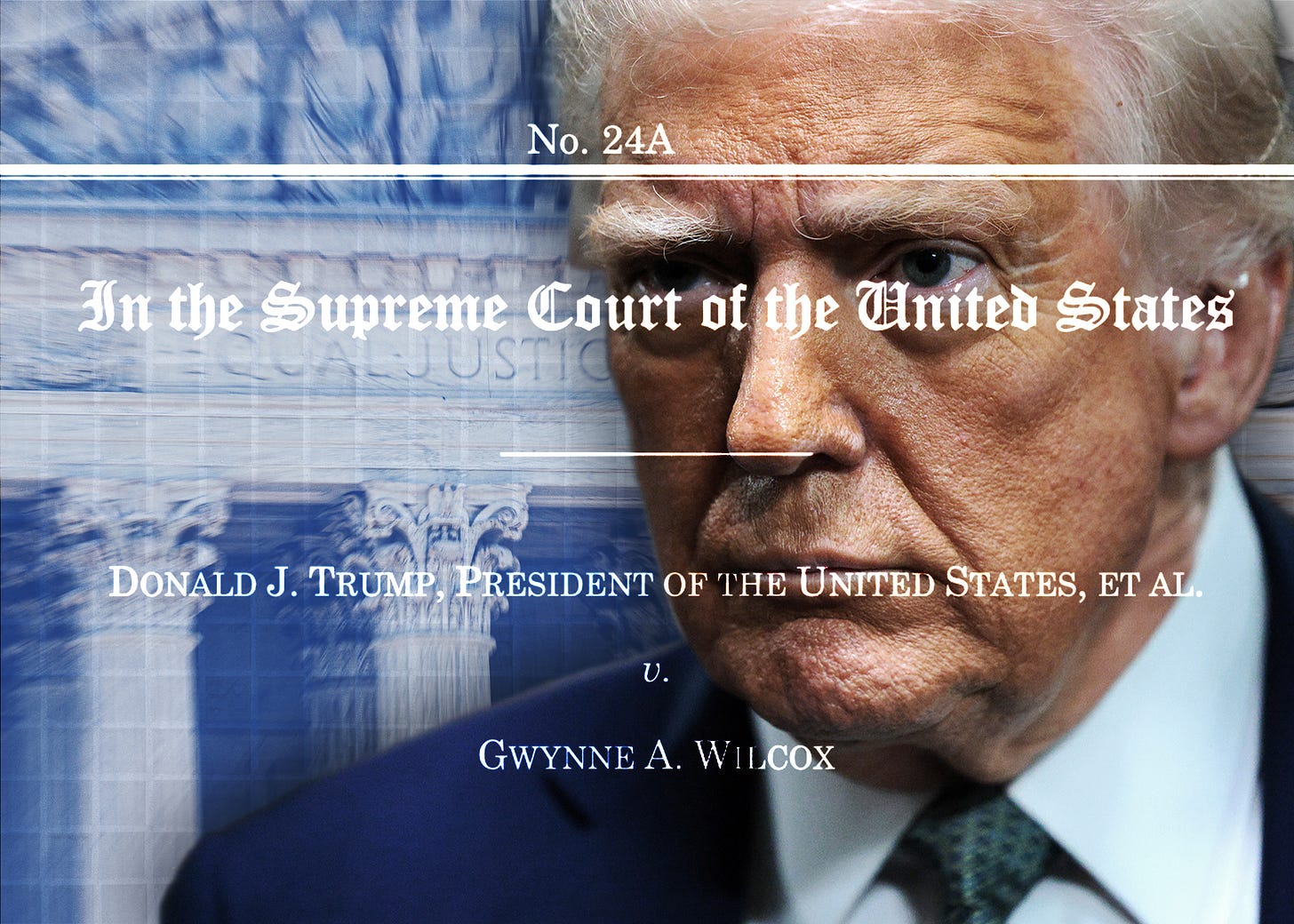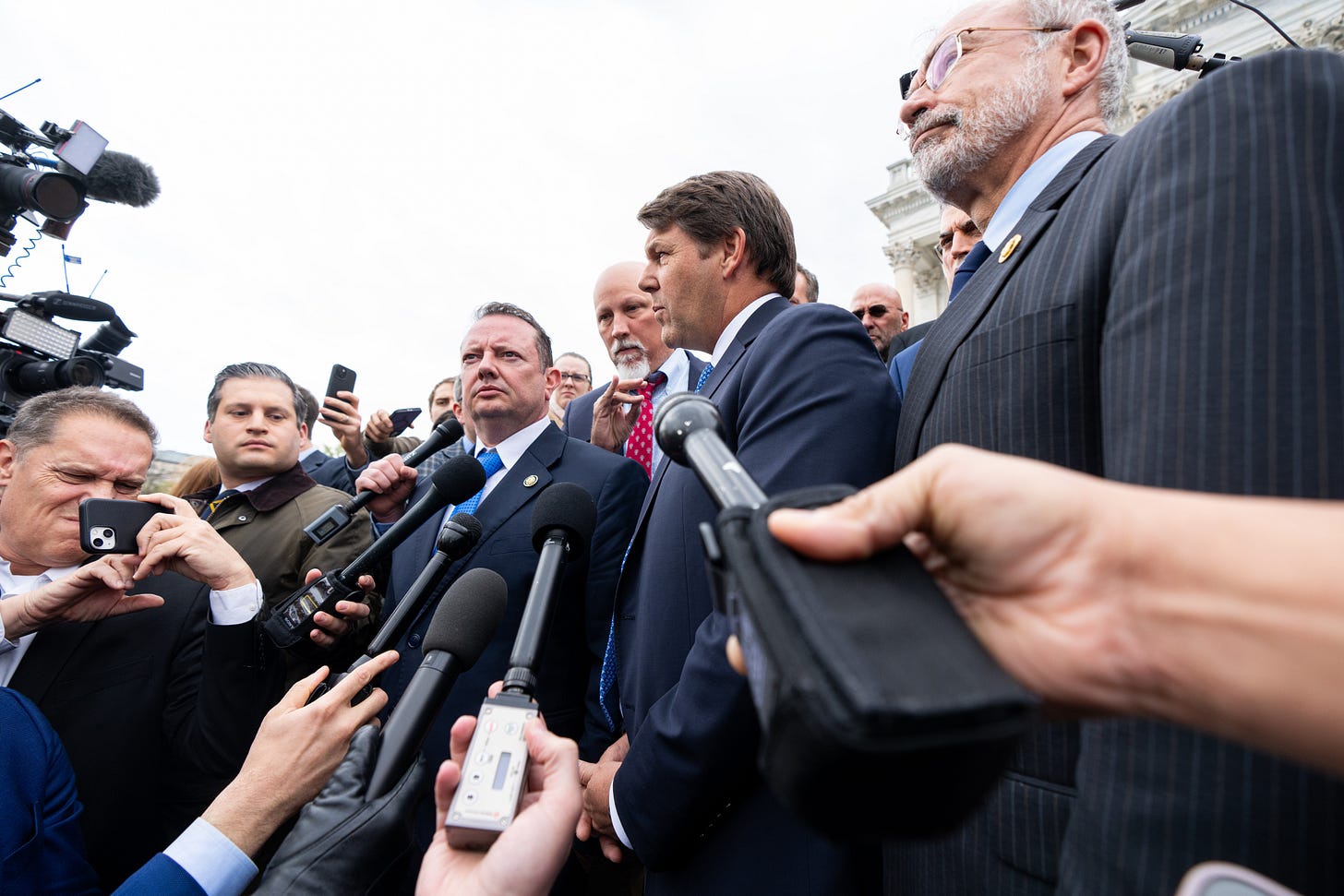
Trump Goons’ Masked Ambush Goes WRONG As Bystanders Are TARGETED
April 29, 2025
The Conservative Case Against Trump’s Latest Power Grab
April 30, 2025HOUSE SPEAKER MIKE JOHNSON SAYS he and his fellow Republicans can pass a version of Donald Trump’s “big, beautiful bill” full of sweeping tax and spending cuts by Memorial Day—that is, in less than four weeks.
Even many Republicans think that’s unrealistic.
Rep. Chip Roy, the archconservative budget cutter from Texas, has told Politico he doesn’t see “deadlines as sacrosanct.” Over in the Senate, Majority Leader John Thune of South Dakota has said his goal is to be done with legislation by July Fourth.
And it’s widely understood the real deadline for action is whenever the federal government hits its debt ceiling, requiring a difficult congressional vote to authorize more borrowing that GOP leaders hope to wrap into the larger tax and spending bill. That will probably happen sometime in the summer, quite possibly the latter part.
You shouldn’t read too much into these machinations. It’s how things always go in Congress. Most likely Republicans will find a way to pass some version of their tax cuts, because it’s the main thing they do when they have power.
But will they get all their tax cuts, which include not just extensions of the ones they passed the last time Trump was president but also new breaks on overtime income and Social Security? Will they pass the spending cuts on programs for low-income Americans—and on clean-energy investments—they envision offsetting some of the lost revenue?
A lot depends on how this whole exercise plays politically—which, in turn, will depend on whether Americans come to understand exactly what Republicans are trying to do.
With that in mind, here are five questions to remember as this debate moves forward.
Republican leaders have said their goal is to cut federal spending by at least $1.5 trillion over ten years, and they seem determined to get a big chunk of those cuts from Medicaid.
It’s an inviting target, since it’s the fourth-biggest item in the budget. But that’s because of its immense reach. Medicaid pays medical bills for more than 70 million (mostly) low-income people, accounting for more than 40 percent of all births. It’s also the single biggest financier of nursing-home care. About two-thirds of Americans say they know somebody personally who has benefited from Medicaid, according to KFF polling.
Mindful of that impact, and the potential backlash to cuts, Republican leaders have frequently said they are not going to touch “benefits”—that they are only going after “waste, fraud, and abuse” in the program.
That may sound straightforward. It isn’t.
Medicaid is a federal-state program, under which D.C. sets the basic rules and provides most of the funds, leaving states to administer it and kick in some money of their own. States have developed all kinds of financing gimmicks designed to increase D.C.’s share of the funding and reduce their own.
Republicans have talked about prohibiting some or all of these gimmicks, and they have a pretty good argument many nonpartisan analysts support: These mechanisms allow states to shirk some of their responsibility for the program. At the same time, the entire health care economy works this way—with all kinds of convoluted workarounds. Take away this one, and it’s virtually inevitable some states couldn’t or wouldn’t make up the funding.
Instead, they would cut back their Medicaid programs in one way or another, leaving more people unable to get affordable care.
And that’s just one of the changes Republicans are contemplating. Another that’s been getting some attention lately is a call to check eligibility for the program more frequently. The theory here is that low-income Americans frequently have variable income and sometimes end up on the program even though they’re no longer eligible.
Both claims are true, to a point, although there’s a lot of disagreement over how frequently that happens. What’s clearer is that checking people for eligibility more frequently creates extra work for both states and individual beneficiaries. Experience has shown—repeatedly—that the end result is people losing their Medicaid, even when they are still eligible, because of bureaucratic breakdowns and complex paperwork.
Falling out of coverage can be particularly worrisome for low-income children, for reasons Joan Alker, research professor at Georgetown, explained over email: “They are frequent users of care as any parent knows and parents can be bankrupted by a trip to the ER for a broken arm or an asthma attack. But they’re cheap to cover for our society and the return on investment is very high—better health, educational, and economic outcomes when they’re adults.”
Those aren’t the only ideas Republicans have floated for Medicaid. They’ve also proposed “work requirements,” meaning working-age adults couldn’t get benefits unless they demonstrated they had a job, were in school, or had a reason (like a disability) they couldn’t do either.
Lately, Republicans have been talking openly about dialing back federal support for the Affordable Care Act’s Medicaid expansion, under which states can get extra funding (usually from D.C.) if they agree to cover anybody with incomes below or just above the poverty line.
Insofar as Republican leaders have acknowledged these ideas are on the table, they have justified them by saying they would affect only able-bodied workers. In fact, these Republicans say, cutting back on support for these able-bodied workers would help the more vulnerable populations by freeing up more government money—and easing the strain on overwhelmed medical providers.
Here’s how Johnson explained it on Fox News a few weeks ago:
When you have people on the program that are draining the resources, it takes it away from the people that are actually needing it the most and are intended to receive it. You’re talking about young, single mothers, down on their fortunes at a moment—the people with real disabilities, the elderly. And we’ve got to protect and preserve that program. So we’re going to preserve the integrity of it.
There are a few arguments embedded in there, each one worth unpacking.
One is that Medicaid’s original architects didn’t envision the program covering able-bodied workers. That’s true. But that was also more than fifty years ago, before the Affordable Care Act—when the architects of that program very consciously decided to have Medicaid cover a much broader group of people, as part of what they hoped would eventually become a universal coverage scheme.
And there’s a reason the Affordable Care Act’s architects made that decision. Plenty of able-bodied Americans can’t get health insurance because their low-wage jobs don’t offer coverage and because they can’t afford to buy insurance on their own. Without Medicaid, they’d be uninsured.
Johnson and the Republicans could certainly undo that decision. That would be consistent with their preferences for less government spending and less government interference in the way private health care markets operate.
But it would also mean millions of vulnerable Americans losing health insurance.
As you may have noticed, another theme of the cuts Republicans are considering is a shift in financial responsibility, so that states pick up a bigger share of costs.
And it’s not just Medicaid where Republican leaders are eyeing that shift. Republicans are also talking about cuts to federal food assistance through the Supplemental Nutrition Assistance Program.
Historically the federal government has covered the entire cost of SNAP benefits, leaving states with responsibility only for the (relatively small) costs of administering it. With this new legislation, Republicans could have states start to pick up a larger share of the costs.
Exactly how much—and by when—is the subject of internal GOP discussions right now, according to Politico. But any change big enough to generate the savings Republican leaders want would leave states scrambling to fill budget holes that could be in the hundreds of millions, or even beyond a billion dollars, according to calculations by the Center for Budget and Policy Priorities.
That’s a lot of money at the state level. And it’d be on top of whatever extra responsibility Republicans gave for Medicaid.
Shifting more responsibility to the states is, once again, a defensible and intellectually consistent goal for Republicans who think that’s better both in principle (because states are more responsive to their voters) and in practice (because states are more in tune with their residents’ needs).
But there are tradeoffs—and reasons programs like SNAP and Medicaid currently rely on federal spending to the extent that they do.
One is to guarantee a minimum level of food and health benefits in all states, including ones where the politicians don’t support maintaining those programs and where there are large numbers of low-income residents—states like Mike Johnson’s Louisiana, it so happens.
Another reason to leave financial responsibility so heavily with the federal government is that nearly all states have balanced-budget requirements. During economic downturns, as people lose jobs and commercial activity slows, declining tax revenue makes it difficult to keep assistance programs going and frequently forces cuts.
The federal government can keep those programs going even during hard economic times—for example, the kind of slowdown many economists now expect Trump’s tariffs to cause.
Not coincidentally, this is when the need for such help is greatest.
Medicaid and SNAP pump tons of money into local economies. Medicaid in particular is a vital source of funding for the health care sector, especially for hospitals and especially in rural areas.
In fact, the ability to sustain struggling rural hospitals and support the jobs they create is a big reason many Republicans who would otherwise oppose government spending ultimately supported expanding Medicaid in their states.
That was certainly the case in North Carolina, where in 2023 Republican leaders in the legislature approved an expansion that went into effect the following year—and, within just a few months, had enrolled several hundred thousand residents. Thom Tillis, who as speaker of the North Carolina House spearheaded the attempt to block Medicaid expansion in the state, now serves as North Carolina’s senior U.S. senator. And he’s changed his tune.
“Well,” Tillis said recently, “you can’t have a policy that affects 600,000 people and not harm beneficiaries.”
Another program also in the mix for possible spending cuts right now is the support for clean energy that became law as part of the Inflation Reduction Act, former President Joe Biden’s signature domestic policy accomplishment.
The push for clean energy has been a favorite target of Trump and his allies, especially when it comes to support for electric vehicles. Reducing or ending that support could free up a few hundred billion dollars in savings, depending on the details.
But all the money the IRA has invested in clean energy is showing up as jobs in communities that are building new factories—or, in many cases, are already operating them. These facilities are all over Texas, as well as in a new “Battery Belt” that stretches from Kentucky down into Georgia.
Yes, those are all red states, which is why a number of Republican state and federal officials have been lobbying to keep at least some of the investments in place.
Going forward, of course, the economy overall will depend on a lot more than just Medicaid, SNAP, and clean-energy investments. The point of this whole legislative exercise is to pass tax cuts, which Republican leaders say will boost growth by more than enough to offset any negative effects from the spending cuts.
Whether or not they are right depends on whose projections you trust and, ultimately, what you believe when it comes to how the economy works. But one point on which nearly all economists agree is that, in the long run, substantially higher deficits will lead to higher debt and more debt service—which, in turn, will mean slower economic growth.
Republican leaders are among those who preach this, saying constantly that current deficits are “crippling” the country. In fact, they say one of their goals in writing this bill is to get deficits under control.
But there is simply not a universe (at least a reality-based one) in which the kind of changes Republicans are discussing don’t cause the deficit to explode.
Republicans have said their goal is to extend the tax cuts they passed in 2017, which are set to expire after this year, and then eliminate taxes on overtime pay and Social Security—and make some other changes, as well.
Put it all together, as the Peter G. Peterson Foundation recently did using public and private estimates, and you get more than $9 trillion in lost revenue over the next ten years. That would dwarf even the most ambitious spending cuts Republicans have outlined.
Republicans have discussed using a different “baseline” for calculating their legislation’s impact on the deficit—in effect acting as if the temporary Trump tax cuts are already permanent so that extending them would appear to have no effect on the deficit at all.
That would work if the idea is simply to get some better headlines. But if the idea is actually to stop deficits from increasing dramatically, and thus reduce risks to the economy, it wouldn’t work at all.
Great Job Jonathan Cohn & the Team @ The Bulwark Source link for sharing this story.






